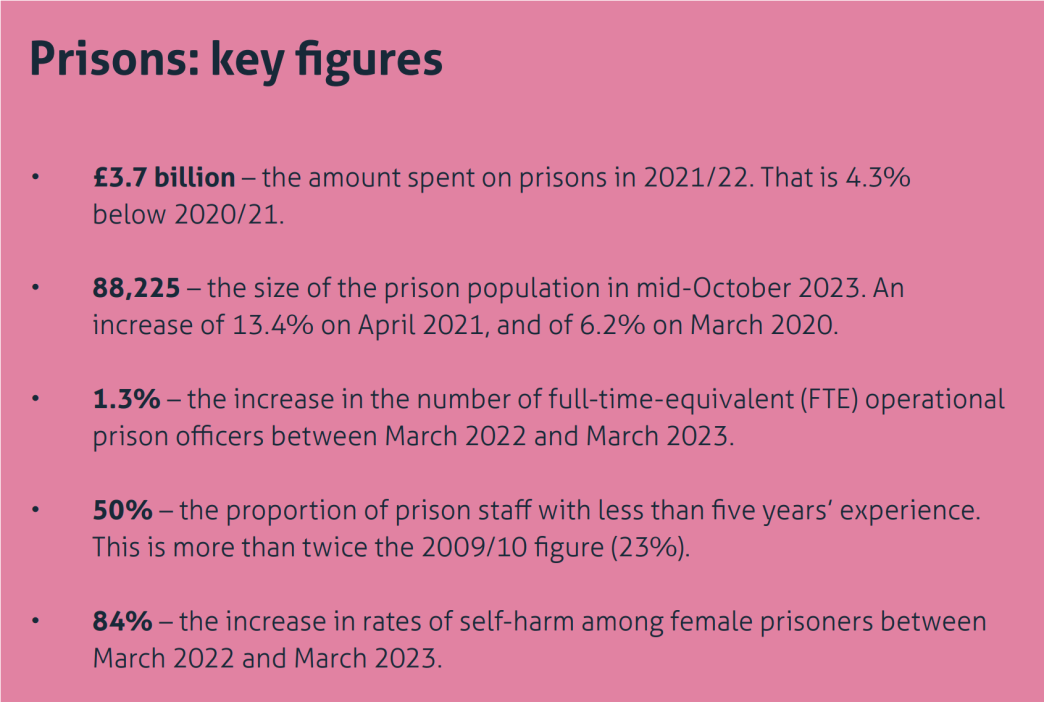Faced with an ‘increasingly unsustainable’ prison population the Ministry of Justice (MoJ) has unveiled more emergency measures, igniting a firestorm of criticism from lawyers and groups representing the vulnerable.
The latest initiative, dubbed ‘Operation Early Dawn’, dictates that defendants in police custody will only be transferred to court hearings if authorities are confident that ‘safe and secure’ prison space will be available. Those detained for ‘less serious’ crimes are likely to find themselves released on bail pending further updates.
The chief exec of charity Revolving Doors Pavan Dhaliwal said that the new measures ‘only serve to exacerbate the chaos and uncertainty faced by both many vulnerable people awaiting trial, keeping them trapped in police cells without clarity of what is going to happen to them and delaying the potential for accessing appropriate support, and also for victims awaiting justice’. ‘Such stopgap measures will not address the challenges facing our overwhelmed justice system. We call on the government to instead provide a long-term plan to tackle the overcrowding crisis which includes the presumption against short sentences,’ she said.
Recent data from the independent think tank, the Institute for Government (IfG), paints a grim picture of the UK prison service. Since mid-2021, prison populations have surged, exceeding the system’s capacity for decent accommodation and pushing it perilously close to its upper limits. Despite increases in staffing and real-terms spending, the MoJ expects the prisoner numbers to grow three times faster than prison capacity.
The current trajectory of the prison population is ‘unsustainable’, warns the IfG. ‘In the absence of (long-term) solutions, we can continue to expect dangerous conditions that harm prisoners, prison officers, and the wider criminal justice system’.

The MoJ’s move to implement new emergency measures reflects the urgency and escalating nature of the situation. Defending the recent actions, a spokesperson for the MoJ explained, ‘We continue to see pressure on our prisons following the impact of the pandemic and the barristers’ strike. This is why we have initiated a previously used measure to securely transfer prisoners between courts and custody and ensure there is always a custody cell available should they be remanded’.
Challenging the government’s position, the Bar Council has argued that assigning responsibility to legal practitioners for the existing crisis is entirely misplaced. ‘To blame the Bar for this, as the MoJ’s statement seems to, is wrong. Covid and the Criminal Bar action happened in the past. It is how you respond to it that is the test for government’.
The Bar Council’s criticism underscores broader concerns within the legal community regarding the government’sresponses to challenges within the criminal justice system. While emergency measures may act as ‘stopgap’ fixes to immediate pressures, its believed that recent measures fail to address ‘systematic problems’ that require long-term planning and investment.
‘Operation Early Dawn is just one symptom of the chronic lack of investment in the criminal justice system for so long’, remarks Sam Townend KC. ‘Real and sustained investment in prisons, courts, judges, solicitors, and barristers is needed and now, otherwise these emergency measures will just precipitate more’.
Inside prison walls, system failures are compounded by workforce shortages and insufficient staff training. Despite a marginal increase in operational prison officers, overall staffing levels remain below pre-2010 levels, raising concerns about safety and prisoner care quality. More data analysis here.
One interviewee told the IfG that not only are ‘unsuitable’ candidates passing ‘poor’ vetting processes during recruitment, but ‘insufficient’ on-the-job training is leaving prisons ‘ill-equipped’ to manage ‘ballooning’ populations.
As the debate over the UK’s prisons and state of criminal justice intensifies, there’s a growing consensus that short-term fixes won’t suffice. The government faces mounting pressure to develop a sustainable long-term strategy addressing the root causes of prison overcrowding and prioritises the welfare of defendants, victims, and prison staff.
‘We remain deeply concerned about the future, or lack thereof’, asserts a spokesperson for the Criminal Law Solicitors’ Association. It’s time to ‘invest much needed resources’ into the ‘wider CJS as a matter of urgency to save our once world-leading Criminal Justice System’.




